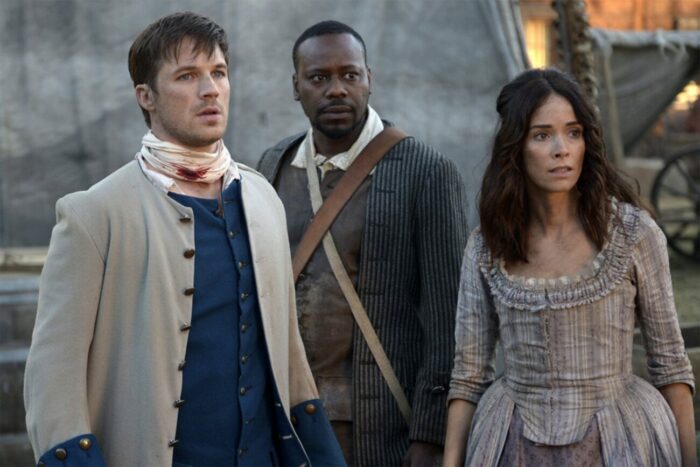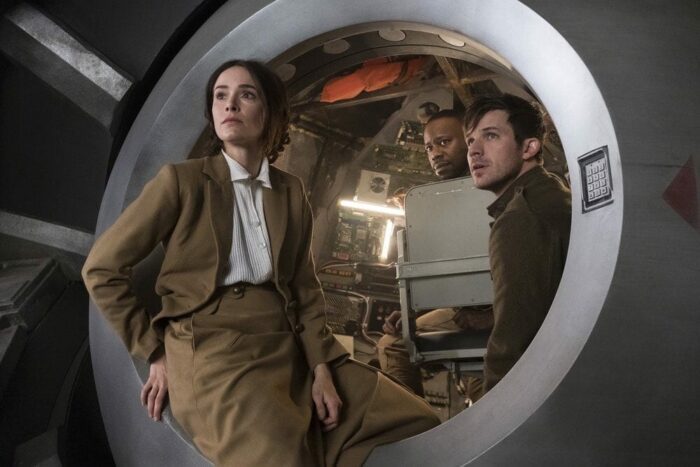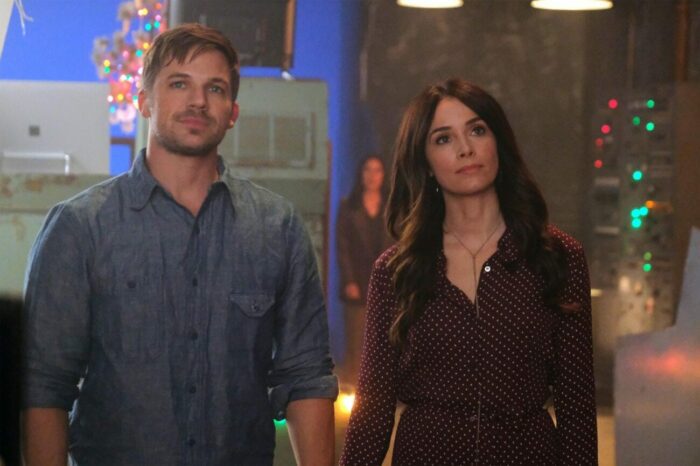Despite emerging as the world’s dominant superpower across the 20th century, the United States of America is, compared to many other global nation states, a young buck in terms of historical brevity. Timeless is among the first television shows to highlight the historical texture of the nation through a science-fiction framework.
Arriving on NBC in 2016, Timeless brought together the pedigree of two successful show runners, Eric Kripke (best known for the long-running Supernatural and latterly The Boys) and Shawn Ryan (the creative force behind The Shield), and the highest of high concepts. A mysterious terrorist, Garcia Flynn (ER’s Goran Visnjic), steals the ‘Mothership’, a top of the range time machine developed by unscrupulous tech billionaire Connor Mason (Paterson Joseph), kidnapping a scientist and heading back to the destruction of the Hindenburg zeppelin in 1934 to change history. The government, in response, recruit crack Delta Force strong man Wyatt Logan (Matt Lanter) and history professor Lucy Preston (Abigail Spencer) to follow Flynn back in the ‘Lifeboat’, an earlier time machine prototype piloted by awkward man-geek Rufus (Malcolm Barrett), and stop him.
The pilot episode moves at rapid fire pace to establish the ground rules of Timeless. How conceptually, week on week, Lucy, Wyatt & Rufus will pursue Flynn through a range of time periods as he works to systematically ‘attack’ American history. Here’s the rub, however: Flynn claims to be operating from a detailed journal Lucy wrote in her future and gave him, and he is using it to root out a sinister, secret organisation called Rittenhouse who are attempting to undermine American history and alter it for their own nefarious ends. Across the sixteen Season 1 episodes, this becomes the status quo as the Lifeboat team learn to trust one another and systematically, and unwittingly, begin altering their own timeline in small but meaningful ways. In working to save American history, Timeless bends and contorts it for narrative purposes, sometimes even for the purposes of humour, while always retaining the core conflict at the heart of the show.
In truth, Timeless will never exactly live up to its title. The show is too derivative, sometimes knowingly so (sometimes not) and finds it almost impossible to remain logically consistent, but what it tackles is genuinely fascinating: the fragmentation, unravelling and corruption of American ‘manifest destiny’.

What is the story of America?
The ‘New World’. A fertile, arable land of opportunity and possibility, colonised by European settlers, liberated by heroic American natives, almost torn asunder by Civil War before a liberal triumph of democracy and emancipation of slaves, and later women. Later, a titan of industry, the world’s most robust Great Power, who rose to rescue civilisation from total war and later fascist tyranny, and as they maintained equilibrium with their decaying superpower opposite they forged the world’s first unipolar entity, a land of hopes and dreams and Civil Rights and counter-culture and human rights, where the so-called ‘American Dream’ was possible for many and reality for some. That would be the story the kindest of historical texts would tell. A story of success, triumph and liberty.
It is a story that Timeless questions by suggesting American history has been tainted since the days of the vaunted Constitution following the War of Independence. “The Capture of Benedict Arnold” suggests that David Rittenhouse, one of the key American actors in the Age of Enlightenment (and the first director of the U.S. Mint), was in truth the founding father not of America but rather a secret society in the highest corners of power who work for over 250 years to influence history. When a time machine predicted by one of their agents, Nicholas Keynes (Michael Eady), at the turn of the 20th century, ends up being built by the aforementioned Mason, the descendants of Rittenhouse have the means from the 21st century to not just influence the American story but actually re-write it to serve their own ends.
And those ends? Tyranny. What else?
Timeless in that sense arrives at an interesting point, right at the turn of America’s Democratic yet fiercely neoliberal Obama administration morphing into what would become the misshapen, funhouse mirror reflection of the idea of America with the election of Donald Trump during the series’ first season. On returning from a trip to 1919 to ensure female emancipation in “Mrs Sherlock Holmes”, Lucy asks their team boss Denise (Sakina Jaffrey) who she voted for in the 2016 election, and she cites Hillary Clinton before confirming Trump won. “Was that supposed to happen?” Denise asks. She gets no answer but the only contemporary political reference in Timeless feels pointed here because it suggests an awareness of the fracturing reality of the accepted American social and political norms happening in the cultural backdrop of the series. The steady decay of American democracy.

This is what Rittenhouse seek, of course, in direct contradiction to the foundational myths of America, and particularly the central libertarian concept of ‘manifest destiny’. Coined in the mid-19th century, it is predicated by the idea that Americans, liberated from their own British colonial tyranny, were ‘destined’ to expand across the North American continent as a means of remaking the West in the vision of the agrarian, and decidedly Christian, East. It is a foundational belief in the exceptionalism of American society, born of a Romantic ideal of extended freedom and greatness – perhaps the original Make America Great (the Again would come later). Whether critics suggested it contributed in so small part to the genocide of Native American people, however true this might be, is almost immaterial. What matters is the story as to how it relates to American history.
Timeless at first proposes a rogue actor in the shape of Flynn as the threat to such destiny. It is surely not coincidental that he has the accent of an immigrant, indeed this is referenced in several episodes (in “The General”, Flynn claims to be from “very far North” when his origins are called into question). Timeless began before the spectre of white supremacist domestic terrorism began to loom large on the American horizon before the Trump era and Flynn represents the ‘Other’ that has terrified Americans ever since their migration Westward. The fact Flynn, for all his dubious moral values at points, turns out to be the tragic hero of Timeless, working to try and counter Rittenhouse’s tyrannical ends (after they murdered his family when he discovered their existence), is all the more pointed an example of what Timeless’ pulp storytelling is doing. The enemy, in this series, is within.
Rittenhouse first begins as a covert secret society, an American Illuminati formed in the Age of Reason working in the shadows (“The Watergate Tape”, one of the series’ strongest episodes, unveils them in the context of 1970s paranoia more akin to The X-Files, with a shadowed Richard Nixon in their corrupt thrall), but by Season 2 they have morphed into a family lineage, a legacy of power which Lucy is descended from and, according to her parents, entitled to as a white, middle-class vision of privilege. This too feels intentional given who was sitting in the White House. For Rittenhouse to be a conspiracy of men is understandable. For them to be a pure-blood white family of old money and power seeking to morph the past to suit their own ends, their own manifested destiny, feels more acute for the 2010s.
Timeless is of course, first and foremost, a fun frolic of a series. Kripke and Ryan take a beat from sprightly time travel series such as The Time Tunnel from the 1960s and Voyagers! from the 1980s, but the show also owes a debt to half a dozen other modern shows about extraordinary people in extraordinary circumstances that boil down to extensions of family and cod-soap opera dynamics—particularly Alias, a show also constructed upon family secrets, inherited lies and arcane truths, and boasting a mythology stretching back centuries. Timeless very quickly abandons any pretension of being a traditional pulp series, despite a new environment every week, and dials into the interlaced personal issues and relationships of the main characters. By the end, they are a dysfunctional ‘family’ of sorts, even if the series has to frequently retcon itself to achieve those dynamics.

In some sense, this works for Timeless, because as a show it is constructed entirely on shifting timelines and realities, both personal and professional. Trying to figure out the temporal mechanics of this show would very quickly make your head spin, as essentially the characters re-write their own chronology week by week, but this corresponds to the morphing template of American history the series depicts. It very specifically suggests that the American story is built on a house of cards, and the slightest imperceptible shifts could move it from the democratic state built on freedom and liberty into the unipolar power Rittenhouse seek to forge designed to enslave the populous. Their exact ends of how to make this happen remain opaque, but we can roughly imagine how that future looks—Rufus at one point describes it as “somewhere between The Hunger Games and The Handmaid’s Tale”. It is, entirely, a dominant white privileged American royalty.
Rittenhouse’s lineage describe themselves in such terms at points. Lucy’s mother Carol (Susanna Thompson) suggests that she is heir to a dynasty and Rittenhouse killer Emma Whitmore (Annie Wersching) calls her “princess”, aggrieved that she had to “work my way up” as opposed to being handed power on a platter. What’s interesting about this is that Emma represents, theoretically, the American Dream – the concept that any individual could achieve success and prosperity through hard work. It is, in real terms, a fallacy, and Emma ultimately realises this, staging her own ‘revolution’ in “Chinatown” and seizing control of the organisation from those who claim to have that personal destiny. Emma represents the angry polity of Americans who know the Dream is a Nightmare, that prosperity is restricted and guarded by those who have known it for centuries.
Timeless works, therefore, to try and restore a sense of order to the chaos of history, and the steady decay of truth and knowledge. Lucy, one of those TV historians who has an encyclopaedic knowledge of everything that has ever taken place, frequently insists that they must prevent Flynn or Rittenhouse from changing the past, even when terrible events occur – such as the assassination of Abraham Lincoln (in the episode of the same name) or the excellent “The Kennedy Curse”, in which a young John F. Kennedy is brought forward from 1934 into 2018, hangs out with some trendy youths and learns about the fate of he and his family. Lucy wants to retain American stability as Rittenhouse specifically works to undermine it for their greater, tyrannical goal. To reduce manifest destiny to a level of personal, established control and manipulation.

On this basis, Timeless deserved to exist for longer as America weathers one of the darkest spells in the history of the Republic. The show exists to decrypt the American story and explore the secrets and truths and fallacies built within established history while reinforcing them, while seeking the concrete reality and sense of truth disappearing and decaying in American life due to rampant polarisation, misinformation and white nationalist patriarchy. Ryan & Kripke’s liberal understanding of popular culture, of protest, of what some would consider ‘woke’ agendas, is riven throughout the storytelling, as female characters create their own empowered space, black characters comment on their own danger and peril within American history, and the establishment is pulled apart, but this adds to the commentary and a feeling Timeless—an expensive, network series in a streaming-driven age—burned out too quickly.
There might be time for more, one day, but if Timeless never again voyages into America’s complicated and traumatic past, it deserves to be remembered as a series that tried to probe the tapestry of a nation that is starting to undergo a reckoning decades, if not centuries, in the making.


I loved this show!